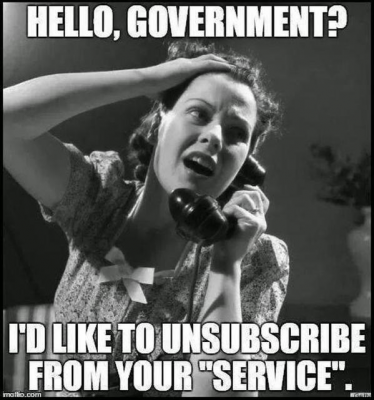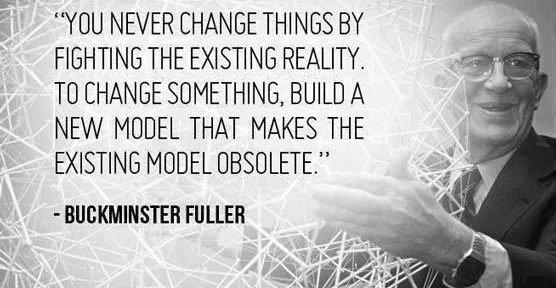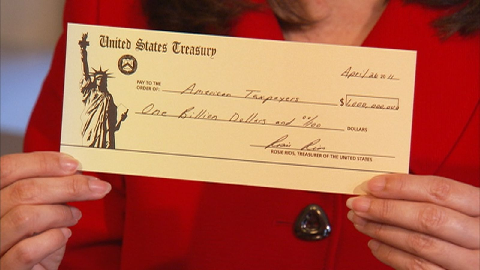Which of these statements is true?
Republicans are Outraged at Democrats!
Democrats are Outraged at Republicans!
Yes, both, of course.
Republicans accuse Democrats of using the Power of Government to Steal from working people to give Free Stuff to Lazy People.
Democrats accuse Republicans of using the Power of Government to Steal from poor and working class people through Preferential Treatment for Big Business.
Is it possible that Half the Country is Evil and the other half of the country is – Evil?
But Republicans don’t think they’re Evil. They believe they are Good.
Democrats? Same thing.
Maybe Politics creates this Confusion over basic issues like Good and Evil. With politics, what each side sees as Good looks like Evil to the other.
Maybe this is Done On Purpose.
Wouldn’t it be nice to have a simple way to See Past the Politics of any issue and clearly Distinguish Right and Wrong?
If you could Discover a simple way to tell right from wrong that would also Light the Path to Freedom, wouldn’t that be worthwhile?
In fact, the answer is so simple it’s not even based on a list like The Ten Commandments. It’s more like The One Commandment.
And yet it clearly lights the way because it is directly related to the most Basic Thing That Makes Us Human.
We know that Man is not the only Animal that makes tools, or communicates, or lives in social groups, or builds homes.
What is it, then, that is Uniquely Human?
All living things need space to live in and things to consume. Non-Human living things simply Take what they need.
What truly differentiates Human from Animal is that a Human is able make the conscious decision to Refrain From Taking. A Human is capable of consciously Choosing Voluntary interaction, in Cooperation with others, to satisfy needs.
Humans choose to Trade, Not Take.
Humans choose to live by the rule “Thou Shalt Not Steal”.
Though all are capable, not every Man makes that choice. But, to actually make and live by that choice, is what it takes for Man to be Truly Wise, Truly Human. (The name Veresapiens comes from the Latin for ‘truly wise’.)
Thou Shalt Not Steal – simple, yet so important that it is considered The One Commandment of Veresapiens.
Humans have always considered Thou Shalt Not Steal so significant that it is a basic tenet of Every Major Religion.
What causes the morality of Thou Shalt Not Steal to be so universally recognized, right along with Thou Shalt Not Kill?
Is it possible that they are essentially two ways of saying the Same Thing?
Yes.
Your earthly lifetime is not infinite. You have one body and a Limited amount of Time to spend in it.
You may choose to Spend some of your brief Time creating something. In other words, you may Trade some of your precious Time for something else of value to you.
If a Thief Takes what you created, is he taking Your Life?
Yes.
It took your time to create your new possession. You Spent Time. That time is gone.
You Gave Up (some of) Your Life for that possession, so the Thief Took (some of) Your Life when he stole it.
And that is why Thou Shalt Not Steal is held Sacred, right along with Thou Shalt Not Kill, in all the major world religions.
Thou Shalt Not Steal is clearly an important commandment, but is it comprehensive enough to be The One Commandment?
Yes.
Let’s explore the meaning of Thou Shalt Not Steal a little further, and see how it manages to cover behavior from petty Theft to Slavery and Murder.
To define what it means ‘To Steal’, let’s first define what it means ‘To Own’.
At the most basic level, Ownership is not a financial term. To Own is to Control.
If you Own something, You can Make All of the Decisions about it, yourself. You can do whatever you wish with something you own. You can use it, give it away, destroy it, whatever. It’s totally up to you.
If you Need Permission to do something with it, You Don’t Own it… at least not fully.
Here’s an illustration of what I mean by Partial Ownership:
Suppose you ‘own’ a house. And suppose you bought the house with a home loan. And, finally, suppose that you rent out the house to tenants.
Financially, you own the house. You are the homeowner. However, your ownership rights have been voluntarily limited, as detailed in your mortgage loan agreement with the bank and your lease agreement with the renters.
For example, you own the house, but you cannot use the house as your home. You have agreed to give all of the normal residential usage rights (control) to your renters for the duration of their lease.
Also, you own the house, but you cannot tear it down and turn your property into a wildlife sanctuary. You have agreed to give up some rights (control), relative to the physical building, to the bank for the duration of the mortgage loan.
The important point here is that Control is Not All-Or-Nothing. And therefore, Ownership is Not All-Or-Nothing. Some portion of your ownership can be given or traded away.
And some Portion of Your Ownership can be Taken away. (And we have thereby arrived at the broader Meaning of ‘Stealing’.)
If someone Takes Away some or all of your Control over your possession, against your will, they are Stealing from you.
Even if, rather than physically taking, they simply Prevent you from exercising Your Full Control over your possession through threats or force, they are still Stealing from you. Because, even if they are not physically taking your possession, they are Taking away your Ownership (control).
Now, here’s a Critical Question.
Do you believe your life belongs to you? If you really Own Your Life, you must fully Control Your Life.
Anyone who Prevents you from exercising full Control over your own life is Taking Your Life.
At a minimum, they are Stealing your Freedom. In the extreme, this can rise to the level of Slavery or Murder.
OK, now that we have fleshed out the broader meaning of To Steal, we can begin to explore how Thou Shalt Not Steal can be applied to political questions.
If the Primary Guiding Principle shaping society was Thou Shalt Not Steal, what kind of government, legal, and social systems would such a Veresapiens society have?
The answer to that question goes back to our earlier discussion of Ownership. If you ‘own’ something, it means that you have total Control over it. If someone Takes away some or all of your Control, then, because they are Taking away your Ownership, they are Stealing from you.
That means that if someone Takes any Control Over Your Life, they are Taking Ownership of Your Life. Taking ownership without permission is Stealing.
Veresapiens, then, would Not Make Rules, or laws, to Control Others’ behavior. That would be Stealing.
Individual Veresapiens would make Rules as to the acceptable use of Their Own Property and the acceptable behavior of visitors to their property. And Veresapiens may rightfully choose to Defend Their Property from unacceptable aggression by others. Such ‘individual property rules’ do not take away any others’ full ownership of their own lives and property.
If a society based on Thou Shalt Not Steal would Make No Laws to Control, Mandate, or Prohibit anyone’s actions, then it would have No Need For a Government. In fact, any imposed form of government, including Democracy, would be Incompatible with a Thou Shalt Not Steal-based society.
Thus, for a whole society to live by Thou Shalt Not Steal as a guiding principle, a totally Voluntaryist social structure is required – one with No Government at all.
You may already live much of your life in a Truly Human, Thou Shalt Not Steal, Veresapiens mode. Think about the ‘Anarchy’ that already exists between You and your Friends and close Neighbors. Do you refrain from stealing from them because of the laws of the government? Do you make up rules that all of them must follow or be punished? Do all of your disagreements get resolved by courts and judges?
If not, you’re already creating your own personal Truly Human Society!
Many truly wise philosophers and authors have written about how an entire Society Without a Government might function, so rather than re-create that content here, let me just recommend a good, easy-to-read introduction, available as a free download at this link:
The Market for Liberty
Of course the most common criticism leveled against this kind of ‘Society Without a Government’ thought experiment is that it assumes the existence of a society somehow magically free of an existing central government.
I have to agree that this is an unlikely scenario for the foreseeable future. And When Governments do Fall, whether by revolution or by conquest, they are, unfortunately, Replaced By new Governments. There is never a shortage of ‘wannabe rulers’ just waiting for their big opportunity.
But, if you think about it, even if there was, magically, a land with No Government, and people had Total Freedom to organize new social structures, they would most likely not end up being one single homogeneous society. Different groups of People would try out Different Approaches, many of which might take hold and thrive. There would also, no doubt, be violent organized gangs of criminals.
Those who wanted to organize around the concept of Thou Shalt Not Steal could do so, but they would still have to Coexist among people with different ideas, values, and social structures, just as your own personal Truly Human Society does today. They would also have to deal with individuals and organized groups intent on stealing their property or their freedom, just as your own personal Truly Human Society does today.
So, we have the same kind of Opportunity Now to organize a Truly Human Society as we would have in the mythical ungoverned land.
Now, at this point, you may still be wondering how the Veresapiens Philosophy Answers current Political Questions in the real world.
So let’s see how our philosophy scales up. As an example, let’s consider this politically hot question:
“What should the Government do about the Problem of Illegal Aliens?”
First let’s Question the Question.
Why are ‘illegal aliens’ a ‘problem’ to be solved?
A common answer would be: “They don’t pay taxes, and yet are served by government programs (paid for by American citizens).”
That answer hints at a new way to look at almost all ‘political’ questions. The answer to why illegal aliens are a problem is centered around Government Programs (taxes and services).
In other words, we need to solve this problem (illegal aliens) because of the impact it has on Government ‘Solutions’ to Previous ‘Problems’ (the collection of taxes and the provision of services).
What happens if we consider the problem of illegal aliens, Setting Government Aside?
OK, setting government aside, what is an illegal alien? Borders are Imaginary Lines drawn by governments to declare their Control over people and places. So, without government borders, there are no aliens, legal, illegal or otherwise. You Just have People. No problem there.
What about taxes and services? Setting government aside, people in Communities would work to Create Products to sell or trade, Provide Services to sell or trade, and would Provide goods or services as Charity for people in need. Taking from some people to give to other people is a government thing.
So, setting government aside, the ‘illegal alien’ problem simply starts to fade away.
You can follow this thought pattern on just about any Political Issue. Instead of answering the political question, as asked, try considering the question itself. And then, setting aside the political roots of the question, Consider the Issue in Human Terms. This approach will lead you to Truly Human Answers.
- What is the Political Question?
- What are the Left vs Right conventional Political Answers?
- How do the conventional Political Answers relate to Government Laws, Activities, or Programs.
- What Different Answers would arise from taking a Truly Human Approach to the issue?
And since we do not, at this time, live in a society that is Free of existing Government, the next question a Veresapiens will ask is…
- To what extent Can You Implement a Truly Human Solution in a Government Dominated Society?
This last point is important to consider, since Truly Human Solutions, implemented fully, may well be Illegal in today’s society. (Think about the impact of Ignoring Government immigration regulations).
Political Discourse, framed in terms of Government Programs, Confuses the distinctions between Right and Wrong.
As you mentally break out of that political frame, you can simply re-frame the original question in terms of basic Morality. And the most basic Human morality is Thou Shalt Not Steal.
Because Thou Shalt Not Steal, when consistently applied, requires that all Human interactions be voluntary, it provides a simple way to determine what the Truly Human approach would be in any situation.
The Veresapiens philosophy helps you distinguish Right and Wrong and helps you find Moral approaches to Social Issues.
The Veresapiens philosophy seldom mandates one particular solution. There will almost always be a range of consistently moral approaches available to a Veresapiens.
All we need to do is ensure that our chosen approach Refrains from Taking property or freedom from others.
This is something we can do Now.
And today, by our example, we help others to also become Truly Human.
Like this:
Like Loading...
 Many of us believe that for ethical and practical reasons societies would be better off without a centralized ruling government.
Many of us believe that for ethical and practical reasons societies would be better off without a centralized ruling government.







